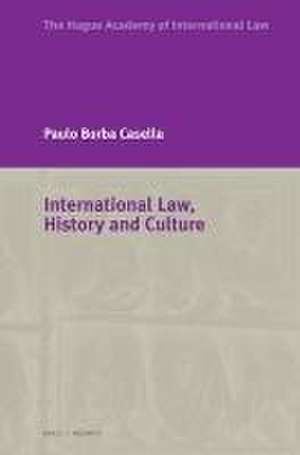International Law, History and Culture: The Hague Academy Special Editions
Autor Paolo Borba Casellaen Limba Engleză Paperback – 8 feb 2024
Changing perceptions of the phenomenon of the Leviathan exemplifies the evolution of international law and the witch hunt which originated in Europe and spread to other continents.
The notions of territoriality and extraterritoriality are discussed in the context of space in postmodern international law. This book will also present the great impact of colonialism on international law. The role of the international protection of fundamental rights is identified as a key factor, evidenced by the protection of religious, ethnic and sexual orientation and gender identity minorities. Lastly, the establishment of the limits on war and the use of force, as well as the interplay between interdependence and cooperation, are depicted as critical challenges in the evolution of international law.
Preț: 317.74 lei
Nou
Puncte Express: 477
Preț estimativ în valută:
60.80€ • 66.25$ • 51.23£
60.80€ • 66.25$ • 51.23£
Carte disponibilă
Livrare economică 03-09 aprilie
Preluare comenzi: 021 569.72.76
Specificații
ISBN-13: 9789004694507
ISBN-10: 9004694501
Greutate: 0.82 kg
Editura: Brill
Colecția Brill | Nijhoff
Seria The Hague Academy Special Editions
ISBN-10: 9004694501
Greutate: 0.82 kg
Editura: Brill
Colecția Brill | Nijhoff
Seria The Hague Academy Special Editions
Notă biografică
Paulo Borba Casella is Professor of Public International Law at São Paulo University Law School. He is President of the Institute for International Law and International Relations (IDIRI), São Paulo, and Coordinator of the Study Group on the International Protection of Minorities (GEPIM-USP) and the Study Group on the BRICS (GEBRICS-USP).
Cuprins
Introduction
Chapter I. International law in time and its role in history – Leviathan and its mutations
A. Leviathan and its mutations
B. Modern scientific thought and the witch hunt
C. From the closed world to the infinite universe
Chapter II. Territoriality and extraterritoriality: space in postmodern international law
A. Territoriality and extraterritoriality
B. The avatars of the notion of extraterritoriality in postmodern international law
C. Territory and international law: the case of Brazil
D. Phases in the formation of Brazil’s territory: lessons in international law
Chapter III. The impact of colonialism on international law, decolonization and the development of the right to self-determination
A. International law – the most international of all branches of law except where it lapses into nationalism
B. The impact of colonialism on international law
C. The race for imperialist colonialism
D. Decolonization and the development of the right to self-determination
Chapter IV. The role of the international protection of fundamental rights as a factor in the renewal and transformation of international law
A. The legal framework for the protection of minorities
B. The protection of religious minorities
C. Protection of ethnic minorities
D. The Yogyakarta Principles (2007 and 2017) and protection of minorities in relation to sexual orientation and gender identity
E. The human dimension in postmodern international law
Chapter V. Challenges and developments in international law in the postmodern
context
A. International law and the notion of postmodernity
B. Limitations on war and the use of force
C. Interdependence and cooperation
Conclusion
Bibliography
Chapter I. International law in time and its role in history – Leviathan and its mutations
A. Leviathan and its mutations
B. Modern scientific thought and the witch hunt
C. From the closed world to the infinite universe
Chapter II. Territoriality and extraterritoriality: space in postmodern international law
A. Territoriality and extraterritoriality
B. The avatars of the notion of extraterritoriality in postmodern international law
C. Territory and international law: the case of Brazil
D. Phases in the formation of Brazil’s territory: lessons in international law
Chapter III. The impact of colonialism on international law, decolonization and the development of the right to self-determination
A. International law – the most international of all branches of law except where it lapses into nationalism
B. The impact of colonialism on international law
C. The race for imperialist colonialism
D. Decolonization and the development of the right to self-determination
Chapter IV. The role of the international protection of fundamental rights as a factor in the renewal and transformation of international law
A. The legal framework for the protection of minorities
B. The protection of religious minorities
C. Protection of ethnic minorities
D. The Yogyakarta Principles (2007 and 2017) and protection of minorities in relation to sexual orientation and gender identity
E. The human dimension in postmodern international law
Chapter V. Challenges and developments in international law in the postmodern
context
A. International law and the notion of postmodernity
B. Limitations on war and the use of force
C. Interdependence and cooperation
Conclusion
Bibliography
